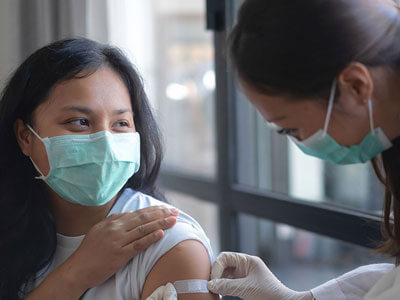Clinical Trials

At Johns Hopkins Medicine, we believe that clinical research is key to improve care for people in our community and around the world. Once you understand more about clinical research, you may appreciate why it’s important to participate—for yourself and the community.
The Effect of DIEP Flap Neurotization on Sensory Restoration After Breast Reconstruction
PI: Gedge Rosson
NCT04533373
The investigators will be performing breast reconstruction using tissue from the patient's abdomen and transferring it to the chest wall to repair the mastectomy defect. Sensory function is restored by using the nerve that supplies the skin of this abdominal tissue (i.e the new ""source"") that is being transferred and attaching it to a nerve in the chest wall.
The Avance® Nerve graft is a nerve graft material that has been produced by Axogen, Inc. The graft is made by processing donated human nerves. This graft is used during neurotization to bridge the gap and join the nerve from the abdominal tissue to the nerve in the chest wall. The use of the graft helps the body to attach these 2 nerves and improves nerve repair.
Tesamorelin Therapy to Enhance Axonal Regeneration, Minimize Muscle Atrophy, and Improve Functional Outcome Following Peripheral Nerve Injury
The aim of this clinical trial is to assess the efficacy of tesamorelin as a therapy for peripheral nerve injuries. The investigators hypothesize that treatment with tesamorelin will allow for faster and greater recovery of motor and sensory function following surgical repair of injured peripheral nerves. Patients with upper extremity nerve injuries will be randomly assigned to receive either the drug or a placebo (inactive drug). A number of tests for nerve regeneration, muscle function and sensation will be performed every month for a total of 12 months. Outcomes in the patients treated with tesamorelin will be compared to outcomes in patients who received the placebo to determine the effectiveness of tesamorelin as a therapy for nerve injuries.
Evaluating GCPII Expression in Denervated Muscles through 18F-DCFPyL PET Imaging
PI: Ala Elhelali
PI: Ala Elhelali
We seek to improve the diagnosis and monitoring of peripheral nerve injuries by utilizing muscle glutamate carboxypeptidase II (GCPII) expression as a novel biomarker for muscle denervation and as a target for 18F-DCFPyL PET imaging.
Human Craniomaxillofacial Allotransplantation
PI: Damon Cooney
NCT01889381
This non-randomized, Phase II clinical trial will document the use of a new immunomodulatory protocol (aka - Pittsburgh Protocol, Starzl Protocol) for establishing face transplantation as a safe and effective reconstructive treatment for devastating injuries/ defects by minimizing maintenance immunosuppression therapy in face transplant patients. This protocol combines lymphocyte depletion with donor bone marrow cell infusion and has enabled graft survival using low doses of a single immunosuppressive drug followed by weaning of treatment. Initially designed for living-related solid organ donation, this regimen has been adapted for use with grafts donated by deceased donors. The investigators propose to perform 15 full or partial human face transplants employing this novel protocol.
Human Penile Allotransplantation
STAT: Standard Therapy Plus Active Therapy to Improve Mobility, Long-Term Activity, and Quality of Life for Severely Burn Injured Patients After Skin Graft Surgery
PI: Scott Vocke
NCT04368117
The objective of the study is to assess the efficacy of STAT, an activity-based therapy protocol compared to standard therapy (ST) to improve functional outcome and reduce disability in patients recovering from burn injury. This randomized multi-center trial is designed with two parallel treatment groups: STAT and ST. Efficacy of the STAT protocol will be determined through comparison to the ST only group. It will be conducted at seven burn centers.
A Phase II, Dose-escalation, Open-label Study Evaluating the Safety and Efficacy of Permanently-placed Acellular Adipose Tissue (AAT) in Human Subjects With Modest Soft Tissue Defects of the Trunk
PI: Damon Cooney
NCT03544632
Nerve Transfers to Improve Upper Extremity Function and Quality of Life in Tetraplegic Patients
PI: Sami Tuffaha; Allan Belzberg
NCT04023591
Current treatment strategies of acute cervical spinal cord injuries remain limited. Treatment options that provide meaningful improvements in patient quality of like and long-term functional independence will provide a significant public health impact. Specific aim: Measure the efficacy of nerve transfer surgery in the treatment of patients with complete spinal cord injuries with no hand function. Optimize the efficiency of nerve transfer surgery by evaluating patient outcomes in relation to patient selection and quality of life and functional independence.
A comparative effectiveness study of speech and surgical treatments using a Cleft Palate Registry/Research Outcomes Network
PI: Richard Redett
An NIH-funded, multi-center, prospective, longitudinal, observational comparative effectiveness study of two common cleft palate repair techniques: straight-line closure with intra-velar veloplasty (IVVP) and Furlow Z-palatoplasty for children with cleft palate and/or lip (CPL). Speech outcome and fistula rate will specifically be analyzed as primary outcome variables. Also as part of this study, we will examine the practice variation in early speech language (El-SL) services, and describe the association of El-SL services with speech outcomes of children with repaired CPL.
OPRTUNTI: Offering Potential for Reproduction Through Transplantation of Uterus iN the Treatment of Infertility
PI: Richard Redett
NCT05646992
A prospective clinical cohort study to establish temporary allogenic uterus transplantation as a feasible and effective reconstructive strategy for the treatment of uterine factor infertility.
A Phase II, dose-escalation, open-label study evaluating the safety and efficacy of permanently-placed acellular adipose tissue (AAT) in human subjects with modest soft tissue defects of the trunk
PI: Damon Cooneyp
NCT03544632
A 12-month, prospective, Phase II, dose-escalation study in human subjects assessing the safety and efficacy of permanently-placed acellular adipose tissue (AAT) intended for the repair of modest (approx. 5-30cc) soft tissue defects of the trunk. It includes a standard care comparator group of patients who plan to undergo autologous fat grafting and have a discrete, modest (approx. 30 cc) soft tissue defect of the trunk that will be filled with autologous fat and tracked for the purpose of this study.
